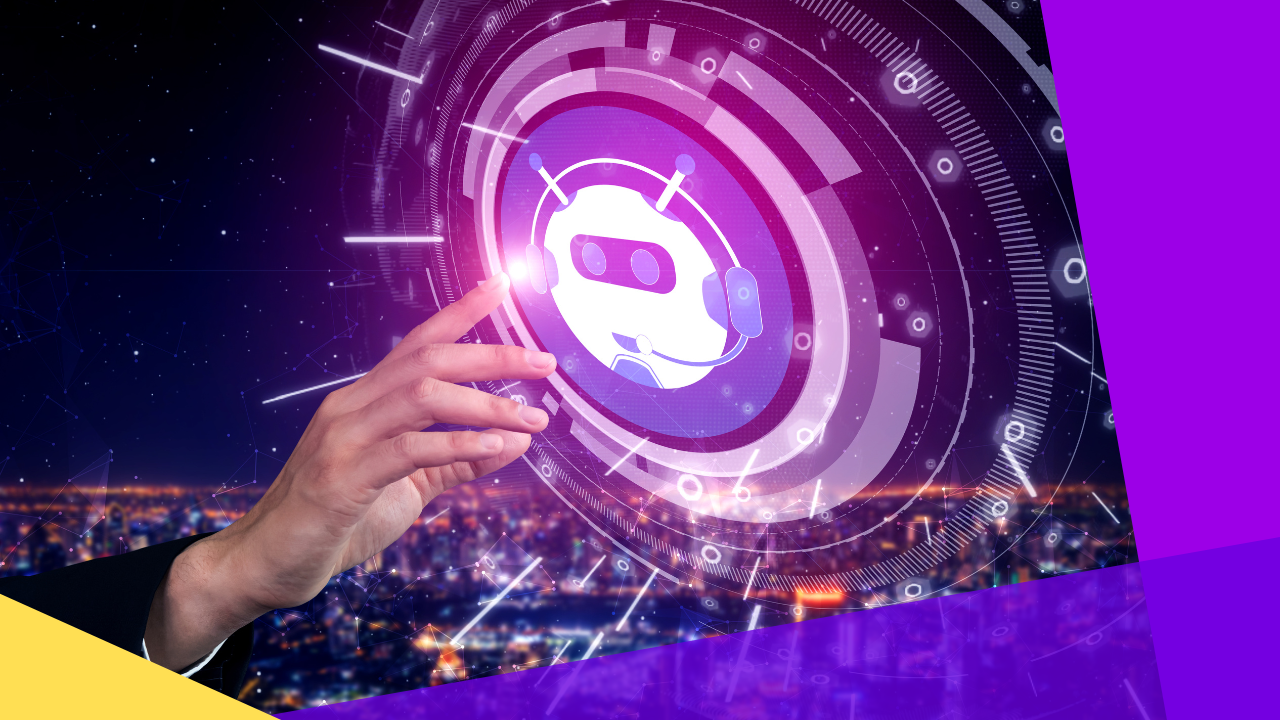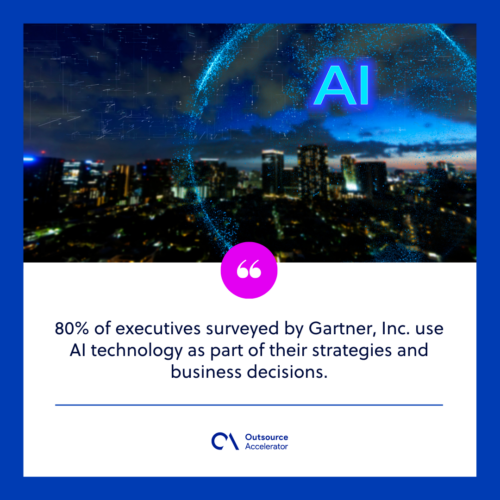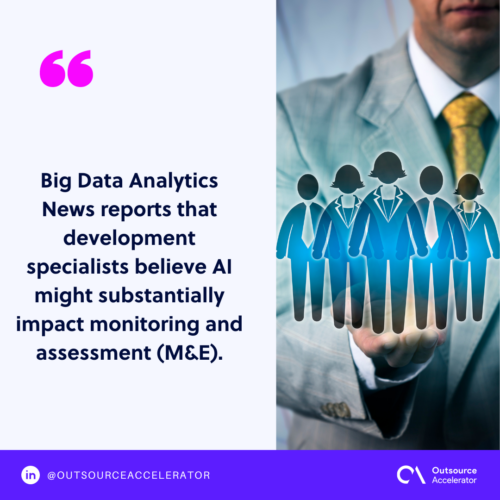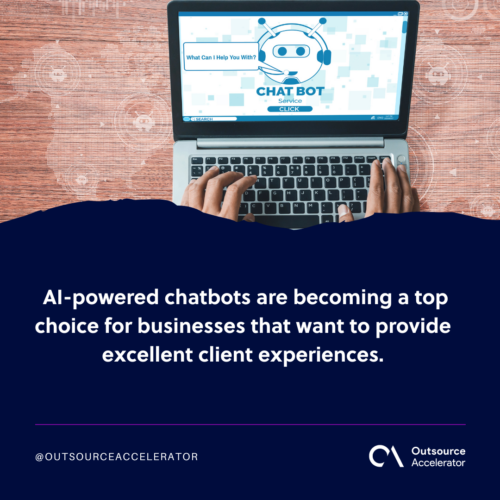Customer experience statistics on AI technology in 2025

In today’s technological world, artificial intelligence (AI) transforms every walk of life. AI has altered how organizations utilize technology for their competitive advantage.
These interactions between artificial technologies and human intelligence are based on algorithms designed to assist managers in making the best decisions.
There will still be technological advancements, AI is still developing,[1] and it’s hard to predict its future. But some reports provide comprehensive statistics about how it enhances customer experience.
This blog post will discuss several customer experience statistics on AI technology in 2023 and how it transforms businesses based on emerging trends and technologies.
Customer experience statistics for 2023
“80% of executives use AI technology as part of their strategies and business decisions.”
– Source Gartner
“AI can potentially lower client acquisition costs by up to 50%”
– Source Marketing in Asia
“Global artificial intelligence (AI) is predicted to grow at a CAGR of 18.45% from 2023 to 2030.”
– Source Contrive Datum Insights
“Successful personalization initiatives can result in 20% higher customer satisfaction, sales conversion rates, and employee engagement”
– Source McKinsey & Co.
“At least 10% of companies are expected to invest in AI-driven digital content creation over the next year.”
– Source Forrester
“Artificial intelligence is now utilized by 80% of high-performing field service businesses”
– Source ZDNet
“70% of CEOs are highly interested in AI-enhanced CX”
– Source IBM
“AI-powered customer service automation is projected to increase at a compound annual growth rate of 58.5% and to be valued at $1 billion”
– Source Revechat
“71% of customers expect personalized interactions from companies, and 76% get upset when this doesn’t happen”
– Source McKinsey & Co.
Customer experience statistics: Utilizing AI technology for CX
Although still in its infancy, AI is developing quickly[2] into the area of its expertise. Which contributes to a better customer experience (CX), more accurate predictions, and higher efficiency.
However, it doesn’t mean AI technologies are replacing humans. It only means that AI and machine learning have become essential parts of human existence.
The following customer experience statistics show how businesses utilize AI technology to streamline their CX in 2023:
- 80% of executives surveyed by Gartner, Inc. use AI technology in their strategies and business decisions.
- AI can potentially lower client acquisition costs by up to 50% and help inform more successful marketing initiatives by deleting old, ineffective, or simply unattractive data.
- Global artificial intelligence (AI) is predicted to grow at a CAGR of 18.45% from 2023 to 2030.

Personalization
As businesses continue to look for ways to increase customer engagement and loyalty, AI technology is becoming an increasingly popular tool for personalization.
Personalization can contribute to a retailer’s success because it results in a great customer experience. Artificial intelligence is used by many businesses to provide customers with more personalized experiences.
According to a report by McKinsey & Company, successful personalization initiatives increase client engagement and revenue. To be more specific, it resulted in 20% higher customer satisfaction, sales conversion rates, and employee engagement.
AI-driven personalization allows businesses to understand customer behavior and preferences better and provide more relevant and timely experiences. Human content production might sometimes not meet the need for tailored content at scale.
Forrester’s study found that AI-driven personalization will be a critical factor in customer experience in 2023. In addition, at least 10% of companies are expected to invest in AI-driven digital content creation over the next year.
Automation
Artificial intelligence can automate various tasks—from customer service to data analysis. Automation can help businesses save time and money by reducing the need for manual labor, and AI makes this possible.
Investments in AI and automation are at the forefront of digital organizational transformation, explains Ritu Jyoti – group vice president of IDC’s Worldwide Artificial Intelligence and Automation.
In fact, 80% of executives surveyed by Gartner, Inc. agree that AI automation can be applied to any critical business decision. AI-driven automation can help businesses improve customer service by providing accurate and timely responses.
Data-driven insights
Organizations work with large amounts of data, and marketers gather their insights from trends, online reviews, success stories, and website data. Business leaders can utilize artificial intelligence technology to maximize these data-driven insights.
It can also be used to analyze customer data and provide personalized recommendations, helping businesses to understand their customers better, avoid poor customer experience, and increase sales.
Feedback and monitoring
AI-powered chatbots provide customers with quick and accurate responses to their inquiries. At the same time, an AI-powered sentiment analysis monitors customer feedback and provides businesses with valuable insights into customer satisfaction.
Big Data Analytics News reports that development specialists believe AI might substantially impact monitoring and assessment (M&E). Innovations such as data gathering, processing, and validation will revolutionize M&E due to the rapid advancement of artificial intelligence.
The Big Data Analytics News also disclosed that a number of firms have already used alternative AI-system implementation strategies.
On the other hand, Forbes claims that the transition to AI-powered client relations is already underway. Many businesses that have successfully navigated this transition are now reaping the rewards.
AI-powered virtual agents will handle customer inquiries, freeing customer service representatives to focus on more complex tasks.
Some companies believe that consumer behavior will drive brand experience with AI. AI-powered analytics will track customer interactions with the brand providing businesses with valuable insights into customer preferences and behaviors.

Customer experience statistics: How AI optimizes CX
AI-driven customer experience helps enterprises understand their customers better and provide them with the best possible experience.
Here are some customer experience statistics that show how AI will optimize CX in 2024:
- ZDNet disclosed that artificial intelligence is now utilized by 80% of high-performing field service businesses.
- As per Chatbots Magazine, adding AI technologies, such as chatbots, can lower a company’s customer care expenditures by up to 30%
- IBM’s study revealed that 50% of companies surveyed are willing to integrate AI directly into consumer interactions. In addition, the survey found that 70% of CEOs are highly interested in AI-enhanced CX
These customer experience statistics show that AI-driven CX solutions will be essential for businesses in 2023. By leveraging AI-driven CX solutions, companies can better understand their customers.
To further explain, below are the specific ways AI optimizes the customer experience:
Automation of customer service
AI-enabled automation, like a chatbot, can help contact centers streamline their customer service operations. AI-powered chatbots are becoming a top choice for businesses that want to provide excellent client experiences.
Because of advancements in machine learning and natural language processing, they are becoming smarter and more human-like.
By delivering immediate responses to frequently asked queries, bots can decrease the workload of contact centers and enable more effective, scalable customer support operations.
In addition to handling customer complaints, chatbots may also provide customer updates. This involves notifying customers about new goods, deals, events, and other activities. The formula is straightforward: The better clients’ experiences are, the more loyal they become.
Overall, AI-powered customer service automation is a great way for businesses to improve customer service while saving time and money.
With the global AI-powered customer service automation, by 2024, the technology is projected to increase at a compound annual growth rate of 58.5% and to be valued at $1 billion.

Improved customer segmentation
Customer segmentation is the process of dividing customers into groups based on shared interests. This allows businesses to understand their customers better and tailor their marketing efforts to each segment.
There are many market segmentation strategies expected to grow in 2023. The first trend is the expansion of AI and analytics usage.
With AI and analytics, marketers can make more innovative judgments to segment their customers. For instance, marketers can obtain insight into the consumers’ requirements, wants, and needs.
Improved customer segmentation can help businesses identify their most valuable customers, target their marketing efforts more effectively, and increase customer loyalty.
Effective customer segmentation can also help enterprises improve their ROI and maximize their marketing budget.
Increased personalization
McKinsey & Company claims that 71% of customers expect personalized interactions from companies, and 76% get upset when this doesn’t happen.
As mentioned earlier, AI and machine learning have become integral to human lives. Contact centers are growing each year and are devising strategies to improve customer engagement.
One of the most popular strategies is leveraging artificial intelligence and machine learning to create personalized experiences. AI and ML allow companies to analyze customer data and create personalized experiences.
Another popular strategy is customer segmentation, which companies use to create tailored experiences for each group’s needs.
Companies using AI for customer experience
As stated earlier, more and more companies are leveraging artificial intelligence to improve customer experience.
Here are some of the most popular companies using AI to enhance customer service:
Netflix
Netflix is commonly recognized as the most prominent platform due to its reputation for providing customers with a vast selection of high-quality streaming videos.
Its global popularity is due to the company’s utilization of cutting-edge technologies such as AI and ML to predict what movies users would like to watch next.
Netflix AI specializes in ML and data analytics, two areas that may be directly attributable to the success of the company’s advertising operations.
Apple
Being a technology-driven company, Apple is known for its rich utilization of various AI technologies, such as:
- Apple Watch’s native sleep tracking – A user may construct nighttime plans to achieve a “sleep goal.” The watch uses machine learning to identify motions and detect sleep.
- HomeKit facial recognition – Users may set up accessories and develop actions for their control using the HomeKit framework.
Amazon
In terms of applying AI to boost the efficiency of its business operations, Amazon has always had an advantage.
A study conducted by the students of BIBS found that Amazon is the most visited e-commerce site in India, with more than 295 million visits across desktop and mobile devices.
It’s not a surprise, given that the company has been doing a great deal of internal work and leveraging AI to enhance its customer experience.
Indeed, with the help of AI, businesses can provide customers with personalized experiences, faster response times, and delivers excellent customer service.
Furthermore, companies can use these AI technology’s latest customer experience statistics to guide current trends and keep the business afloat in the competitive landscape.
Article references:
[2] AI is developing quickly: Goralski, M., and Tan, T.K. (2020). “Artificial intelligence and sustainable development.” The International Journal of Management Education, 2020 Vol. 18 (1). doi.org/10.1016/j.ijme.2019.100330







 Independent
Independent




